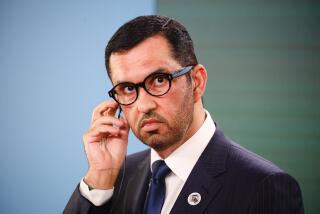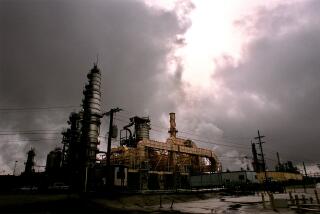Iraqis Are to Attend OPEC Meeting
- Share via
LONDON — An Iraqi delegation is to attend next week’s meeting of OPEC members for the first time since U.S.-led forces deposed Saddam Hussein -- a significant boost for a new government hungry for global recognition.
Re-integration into the Organization of the Petroleum Exporting Countries is one of Iraq’s biggest steps so far on its path toward normalized international relations, given the importance of oil exports to its economy and the success of its interim government.
Already, representatives of the U.S.-picked Iraqi Governing Council have been welcomed this month at an Arab League meeting in Cairo and a Conference on Disarmament session in Geneva.
However, some doors remain closed. Malaysian Foreign Minister Syed Hamid Albar said last week that the Governing Council would not be allowed to participate at the annual meeting in Malaysia of the Organization of the Islamic Conference. He cited the U.S. military occupation of Iraq as the reason.
OPEC Secretary-General Alvaro Silva told senior members of the Iraqi Oil Ministry in a telephone conversation that Iraq’s oil minister would be welcome at the meeting next Wednesday in Vienna, OPEC spokesman Omar Ibrahim said Tuesday.
In Baghdad, Iraq’s oil minister, Ibrahim Mohammed Bahr Uloum, confirmed that he would attend.
Iraq, one of OPEC’s five founding members, has the world’s second-largest proven crude reserves, at 112 billion barrels.
OPEC members supply about a third of the world’s oil, and they plan to reassess their production quotas and output at next week’s meeting.
Iraq’s postwar crude production has lagged far behind expectations, largely a result of looting, sabotage and problems with the electricity supply.
Iraqi officials last week estimated the country’s output at about 1.6 million barrels a day, well below the 2.1 million it was pumping before the ouster of Hussein.
However, as Iraq gradually increases its output, other OPEC members may come under pressure to pump less crude to keep oil prices from falling. Saudi Arabia, OPEC’s biggest producer and most influential member, will probably face the loudest calls to curtail its output to help make room for a revived Iraq.
More to Read
Sign up for Essential California
The most important California stories and recommendations in your inbox every morning.
You may occasionally receive promotional content from the Los Angeles Times.










